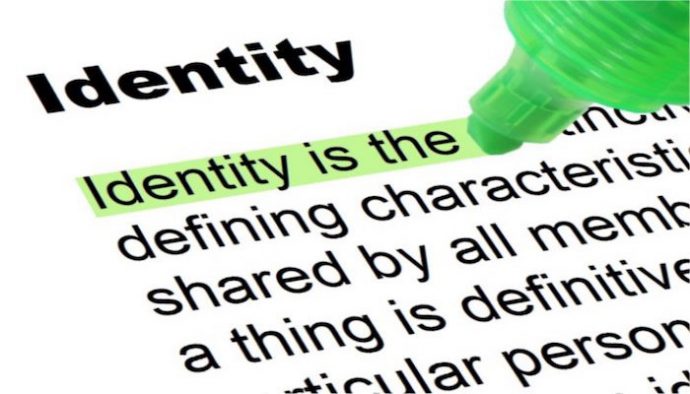The question of identity is a simple one. You would think that we would be able to give a quick, straightforward answer to an inquiry like this: “Who are you?”
And yet this question – the question of identity – is an increasingly relevant one. Nationalism. Privilege. Ancestry. Gender. Politics. All these cultural discussions have an element of identity at their core. Now, like never before, we seem to be asking that question not just about others, but about ourselves. “Who am I?” we ask. “To what do I belong?”
The answer had no doubt fluctuated for you over time, as it has for me. Who am I? Probably you answered that question differently in middle school than in high school, different in college than in your first job. And still different if you are married and are in the middle of parenting kids.
The Bible, too, has an answer to that question. But the Bible not only answers the question of Who am I, it also answers the question of Who are we? Not just as individuals, but together, as Christians. And here’s one of the places where it does:
But you are a chosen race, a royal priesthood, a holy nation, a people for his possession, so that you may proclaim the praises of the one who called you out of darkness into his marvelous light. Once you were not a people, but now you are God’s people; you had not received mercy, but now you have received mercy.
Dear friends, I urge you as strangers and exiles to abstain from sinful desires that wage war against the soul. Conduct yourselves honorably among the Gentiles, so that when they slander you as evildoers, they will observe your good works and will glorify God on the day he visits (1 Peter 2:9-12).
So that’s who we are. A royal priesthood. A chosen people. Those who have received mercy. But why does it matter? Why is it important that we know who we are as Christians? Let me then give you six reasons why knowing and understanding our identity as Christians deeply matters:
1. Our identity tells us where we belong.
We want – no, we need – to belong. To identify with a group of people. To love what they love and value what they value. And that’s a question we seem to always be seeking to answer, for in all of us, there is a desire to belong. To know the inside jokes. To be accepted. To be deeply known.
This question of identity answers that question for us. Where do we belong? We belong to the people of God. Our days of being on the outside looking in are over. This is good news. This is news of freedom. It means we don’t have to try and figure how what group to identify with on a daily basis. It means we don’t have to be enslaved with the pressure of constant self-discovery and reinvention. It means that no matter what job we have, no matter how much money we have, no matter what title we have, and even no matter how we feel, the question of who we are has already been answered, and it’s been answered like this:
“You are mine,” and by corollary, “you are with us.”
2. Our identity tells us we are wanted.
Can you just breathe that in for a second with me? You are not only loved. You are not only accepted. But you are wanted. As silly as it is, the image that comes to my mind is the pressure cooker of the elementary school playground when teams are being chosen up. Now perhaps you were always the best athlete on the playground and you spent those moments thinking, Which one of these teams is going to win, because that’s the team that is choosing me. But the rest of us spent those agonizing moments sizing up everyone else out there on that field thinking, Is there anyone for sure that will be chosen after me? Because I don’t want to be the last one.
Knowing your identity means knowing that you are wanted. That God has not just settled for you, but He has in fact chosen you. Oh, friends, it’s such a wonderful thing to be wanted. And that is what you find here, in this chosen people – a people who once were on the outside, but have been chosen to come on in.
3. Our identity puts a weapon in our hands.
Knowing your identity helps you fight, and we need to fight. That’s because there is a huge difference between knowing the truth, and feeling the truth. You know that you are a member of the chosen race; a stranger and alien in the world; the royal priesthood; but chances are, you’re not going to wake up feeling that way tomorrow morning. You will wake up feeling despondent. Left out. Put aside. Stepped over. And it is a moment when all of us will be tempted to be victimized by our own feelings.
Here’s the thing about feelings, though – they are valuable for many things and in many ways, but they are completely unreliable when it comes to spiritual truth. This is one of the ways that Christians stand apart from the rest of the world – it’s that we understand that our feelings, too, must be brought under the authority of Jesus as Lord. So the question becomes for us not who do we feel like we are; but who does Jesus declare us to be. Identity is not a matter of feeling or even of choice; identity is a matter of declaration.
We fight our feelings with the knowledge Jesus’ declaration of our identity.
4. Our identity gives confidence to our actions.
Imagine this. Imagine that you’ve been invited to a dinner with important dignitaries – maybe this is a state dinner. So you go and rent a tux or buy a new dress, and you show up, and immediately you know you’re in over your head. The conversations around you seem to be about geopolitical politics, deep economic issues, and other such things that you don’t know much about. You don’t even know which fork to use with which course.
You might end up doing the right thing, but you would do it with shaking hands and a nervous stomach. That’s because you know you don’t normally attend these kinds of things. As cool as it is to be there, you feel a little bit out of place.
The point of the illustration is this – knowing your identity in Christ gives you confidence in your actions. When you begin to accept that God has declared you to be a royal priesthood, a chosen people, His own possession, you start to act in godly confidence.
Because you have been made new by Jesus, the living stone, every time you act in godly love, joy, peace, patience and the rest, you are actually acting in conformity with who you really are. That means those moments when you show patience to your children, when you display integrity at your job, when you say no to things like sexual temptation – you can do that in confidence because you’re not just acting like someone that you know in your heart you’re really not. You are living out the person God has remade you to be in Christ. Conversely, every time we choose sin, it’s as if we are putting on a mask and acting like someone that we are not.
5. Our identity makes us long for home.
Knowing our identity also makes us long for home. Let me take you back to that state dinner. Sure, it’s a cool experience, but in the middle, can’t you see yourself thinking how nice it will be to be at home? In your home? With the smells you know? The comfortable seat on the couch? The place where you know you are safe to be yourself? This is a longing inside of all of us – to be at home.
And for the Christian, that longing is even more pronounced because we are not at home. Peter tells us that our whole experience on earth is as a stranger. An alien. As a people who doesn’t quite fit. We don’t fit with the desires of the world. The goals of the culture. The priorities of those around us. That’s because our home is somewhere different. That sense inside you that there is more? That’s a good thing, for that is the Spirit of God reminding you that your identity, and your citizenship, is not here.
CS Lewis would say it like this: “If we find ourselves with a desire that nothing in this world can satisfy, the most probable explanation is that we were made for another world.”
Oh, to be at home. But in the meantime, our actions, in which we are confident because we know who we are, should reflect not this world but the kingdom of heaven for which we are bound. Be weird, Christian. Be different. And do so because you know who you really are and where and to whom you really belong.
6. Our identity reveals us our deeper purpose.
Finally, knowing our identity reveals our deeper purpose. The greater end of our identity, and therefore our actions as Christians, is the glory of God. And there is no greater end than that.
Think about the context of these verses with me. Remember that these Christians were being persecuted and maligned because of all kinds of rumors floating around about them. Peter does not tell them to organize and launch a “truth about Christians” campaign. He does not tell them to conduct great rallies of self-defense. No – Peter tells them simply to remember who they are. To live out who they are. And know that those same people who are maligning them will not only see but benefit from their faithful acts of godly kindness and grace and glorify God. So may it be with us today.
Subscribe to MichaelKelley.co
Never miss a new post. Subscribe to receive these posts in your inbox and to receive information about new discipleship resources.





2 Comments